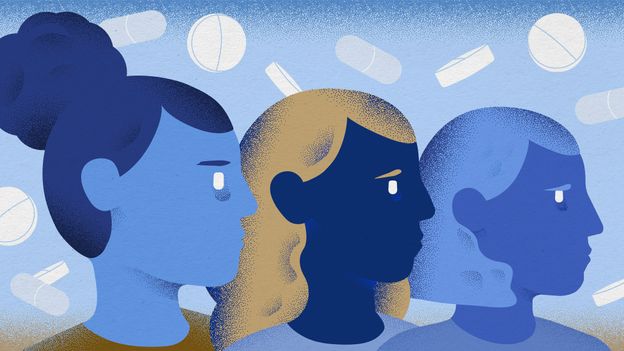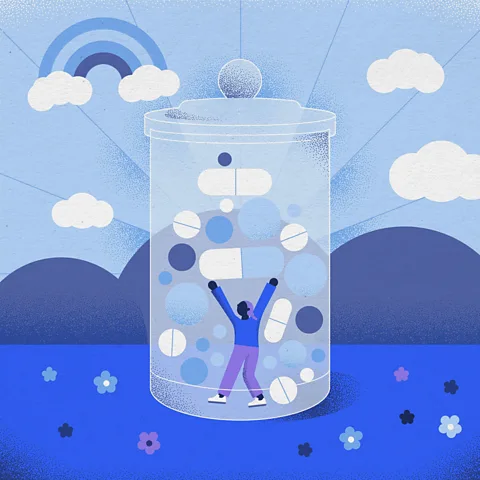

Dempsey Ewan
Many women express concerns regarding the potential effects of contraceptive pills on their mental health. Is there scientific evidence to support these worries?
Like many young women, Sarah E Hill relied on contraceptive pills throughout her late teens and twenties. “I never thought about it twice,” recalls Hill, a researcher teaching evolutionary psychology at Texas Christian University. It wasn’t until she changed her contraceptive 12 years later that a realization struck her.
“My life seemed more vibrant and exciting, as if I had transitioned from a flat black-and-white film to a colorful, immersive experience,” says Hill. Her journey with oral contraceptives prompted her to investigate the science behind them, resulting in her 2019 publication,
How the Pill Changes Everything.
Alongside addressing valid issues, social media influencers have been known to spread misconceptions regarding the side effects of contraceptive pills, both physically and mentally. With no medical qualifications, some individuals encourage women to completely abandon contraception—a trend linked by experts to a recent increase in
abortions in the UK.
But do contraceptive pills genuinely alter personality traits and life perspectives? Are they linked to severe mental health conditions like anxiety, depression, or even suicidal thoughts in extreme scenarios?
A Gradual Reckoning
The verdict does not appear straightforward.
When the pill was introduced in the United States in 1960, it quickly gained a staggering 1.2 million users within just two years. These small beige pills became a revolutionary contraception method, celebrated by women as a sign of sexual liberation, relieving them of the anxiety surrounding unintended pregnancies that could disrupt their careers or education.
Contraceptive pills fall into two categories, both of which are composed of synthetic sex hormones. The predominant type is the combined pill, which contains artificial versions of estrogen and progesterone; the other type is the progestogen-only pill, also known as the “mini-pill.” Both varieties aim to prevent pregnancy through multiple mechanisms, including suspending ovulation and thickening cervical mucus to hinder sperm from reaching an egg.
Notably, the hormones in these oral contraceptives not only influence physical health but can also profoundly affect women’s brains.

Dempsey Ewan
“The effects of hormones on brain function are intricate,” states Johannes Bitzer, an obstetrician-gynecologist and psychotherapist at the University Hospital Basel in Switzerland. “For some individuals, the pill can positively influence mental well-being, whereas in others, it may lead to irritability and anxiety.”
Mostly, medical warnings regarding the pill’s mental health implications have been minimal during its 65-year history. Many sexual health providers in both the UK and the US fail to address mental side effects on their websites.
“The significant issue is that mental health is not extensively covered in OBGYN training; it’s typically within the purview of psychiatrists,” Bitzer explains. Although changes are occurring gradually, he mentions that discussions around the pill often concentrated on thrombosis, cancer, irregular bleeding, and weight gain, with mental health concerns largely overlooked.
Unfortunately, little research has delved into the mental side effects. However, a pivotal shift began in 2016 when a Danish research team published foundational findings on this topic, leading to a surge in subsequent studies.
In the original Danish study, researchers examined national health records tracking the mental well-being of over a million women aged 15 to 34 over 14 years. They discovered that women who commenced using the combined pill were 70% more likely to be prescribed antidepressants within six months compared to those who had never taken oral contraception. The risks escalated to 80% for those starting the mini-pill.
In 2023, additional researchers examining a quarter of a million health records in the UK Biobank found similar patterns, revealing that those using the pill were 71% more likely to experience depression two years after initiation compared to non-users.
“There is a significant temporal correlation between starting these products and the onset of depressive symptoms,” explains Øjvind Lidegaard, a medical epidemiologist at the University of Copenhagen, who led the Danish study.
Nonetheless, both studies were observational cohort studies, meaning they could highlight an association but not determine causality. Pre-existing differences among groups of women could skew results.
Contradictory Findings
Some research appears to challenge the link between certain mental health issues and contraceptive use. For instance, a review of 26 previous studies by researchers at Ohio State University found only a “minimal” association between progestogen-only contraceptive methods and depression. Individually, two trials in Sweden involving 200 to 340 women reported no significant correlation between the combined pill and either depression or mood deterioration.
Interestingly, some findings indicate that the required seven-day “break” from the pill may worsen mood. A 2023 Austrian study with 120 women using the pill reported a 7% rise in anxiety during the pill pause, as well as 13% and 24% increases in negative emotions and mental health symptoms respectively.
“From a mental health perspective, continuous use may be more beneficial for contraceptive users,” suggests Belinda Pletzer, a cognitive neuroscientist at the University of Salzburg, who is leading EU-funded research on the impact of hormonal contraceptives on women’s brain function.
Pletzer acknowledges that while a small percentage of women do experience adverse psychological effects while on the pill, these instances should be given due attention.
One possible explanation for the varying results across studies on mental side effects relates to the subjective nature of mental health assessments, which can complicate research. The existence of numerous pill types (over 30 brands of the combined pill alone) may also lead to comparing heterogeneous data.

Dempsey Ewan
According to Bitzer, the focus of research outcomes can influence findings. For instance, in the Danish study, the prescription of antidepressants does not necessarily equate to a depression diagnosis, complicating the outcome assessment.
Establishing cause-and-effect relationships in observational studies is inherently challenging, states Sofia Zettermark, a physician based in Gothenburg, Sweden, considering that environmental factors and genetics may also affect results. In her examination of almost a million women within the Swedish national registries, for instance, she found that those from lower-income and immigrant backgrounds showed heightened sensitivity to mood changes when on hormonal contraception.
Lidegaard emphasizes that his findings must be contextualized. “While some women experience significant mental health changes upon beginning hormonal contraception, it’s essential to recognize that only about 7-8% face such severe incidences that lead them to discontinue use. The majority of women using these products do not report significant discomfort.”
Furthermore, for many women, the advantages of oral contraceptives can outweigh potential negative effects. Apart from being an effective contraception method, both the combined and mini-pill can provide additional health benefits. For women dealing with conditions like
endometriosis, heavy menstrual bleeding, or
PMDD (premenstrual dysphoric disorder), the pill may provide significant relief.
Given the complexities involved, particularly in the developing countries, pregnancy may pose considerable health risks. Additionally, research has linked
unplanned pregnancies to elevated depression risks.
Impact on Brain Chemistry
In cases where mental health is affected, what mechanisms are at play?
Oral contraceptives can influence mood through various pathways.
Both the combined and mini-pills, along with hormone replacement therapy (HRT), are composed of synthetic hormones that alter the natural hormonal cycles. These include progestins, artificially created progestogen hormones that can be synthesized through various methods; however, most are derived from testosterone. Synthetic estrogens and progestins are not chemically identical to the hormones produced endogenously by the body.
This disruption may lead to several consequences. One potential issue is that women taking the pill might experience altered serotonin pathways—the neurotransmitter often referred to as the brain’s natural mood enhancer.
In a study, Danish researchers investigated brain activity among 53 healthy women, with 16 of them consuming oral contraceptives. They analyzed serotonin system functionality and found that the pill takers exhibited 9-12% lower serotonin signaling compared to others who did not take these medications.
This effect was notably twice as significant as the changes associated with selective serotonin reuptake inhibitors (SSRIs), which are commonly used antidepressants. The researchers speculated that this alteration could be a key factor linking oral contraceptives and depression.
There is also emerging evidence suggesting that the synthetic estrogen and progestins found in oral contraceptives may impede the production of allopregnanolone, a hormone crucial for mood regulation and stress response. A pharmaceutical variant of this hormone was approved in the US in 2019 for treating postpartum depression.
Typically, progesterone can be converted into allopregnanolone in women not taking synthetic hormonal contraception. However, for those on the pill, this conversion may be disrupted, meaning they potentially miss out on the hormone’s anti-anxiety and antidepressant properties.
In rat studies, those consuming oral contraceptives displayed lower brain levels of allopregnanolone. Furthermore, another rat study indicated that reduced allopregnanolone levels corresponded with diminished social behavior and sexual desire—effects the authors suggested might be relevant to women taking oral contraceptives. However, animal study results do not always correlate with human outcomes.

Dempsey Ewan
Compounding the issue, the pill can interfere with a woman’s stress response, leading to potential anxiety and depression. “Studies show a diminished cortisol response to stress typically experienced by women with natural cycles,” explains Hill. “A lack of cortisol may seem beneficial on the surface, but this isn’t how it should function; cortisol is not the cause of stress. Instead, it aids in coping and recovery from stress.”
Risks for Adolescents
Lidegaard highlights a particular group of concern: teenage girls. His research indicates that those aged 15 to 19 were 1.8 times more likely to receive an antidepressant prescription after commencing the combined pill compared to those not using it. For mini-pill users, the likelihood was even higher, at 2.2 times.
Similarly, Zettermark’s study revealed that adolescent girls exhibited the
strongest correlation
between hormonal contraceptives and a rise in antidepressant and anti-anxiety medication use. Those aged 12 to 14 were 240% and 190% more likely to receive prescriptions for these medications within a year after starting the combined and mini-pill respectively—or 52% and 83% for those aged 15 to 17.
A further analysis involving over 264,557 women in the UK Biobank indicated that those who had ever taken oral contraceptives had a
heightened risk of developing depression over time, particularly pronounced within the first two years of use.
In addition to adolescents, healthcare providers often hesitate to prescribe oral contraception to women with a history of depression, recurrent depressive episodes, or any psychiatric disorders, warns Kopp Kallner.
Experts such as Kopp Kallner emphasize the importance of self-awareness—monitoring one’s mood during the initial months of starting the pill or during a switch in brands. If there are concerns about the impact of contraception on mood, it’s advisable to consult with a healthcare provider. Given the multitude of progestins and combinations available, mixed with varying doses and formulations, the process of finding the right contraceptive is “similar to an art,” according to Bitzer, and should be tailored to individual needs.
There are also many other contraceptive options that either don’t contain hormones or use lower doses than oral contraceptives, including male and female condoms (which also help guard against STIs), the vaginal ring, the hormonal coil (IUS), the copper coil (IUD), and permanent sterilization.
For Hill, switching her contraceptive method dramatically changed her life. “Take the time to explore your options for pregnancy prevention until you find one that aligns with your sense of self,” she advises. “With patience and self-kindness, you’ll find the right solution for you.”
* The information provided in this article is for general purposes only and should not replace professional medical advice. The BBC is not responsible or liable for any self-diagnosis based on the content provided on this site. The BBC also does not endorse any external sites mentioned herein, nor any commercial products or services discussed on these sites. Always consult a healthcare professional if you have health concerns.
For scientifically backed insights into enhanced health and wellbeing, consider subscribing to the
Health Fix newsletter
, while
The Essential List
features carefully curated insights.










